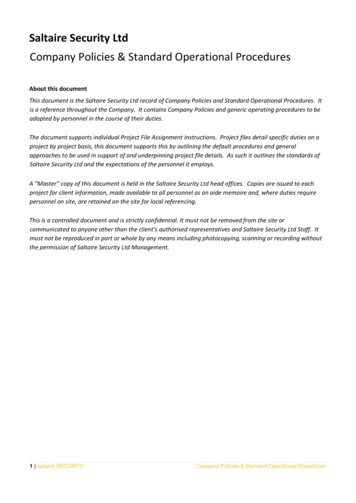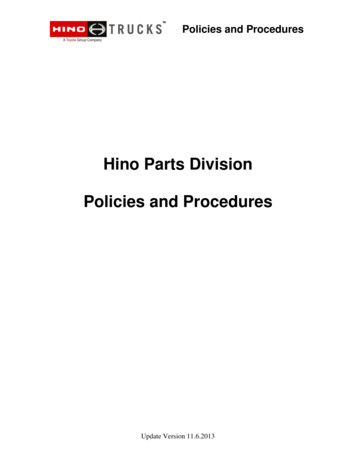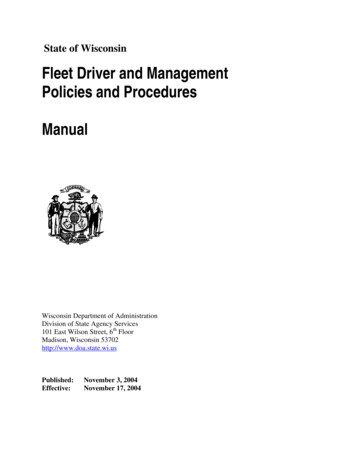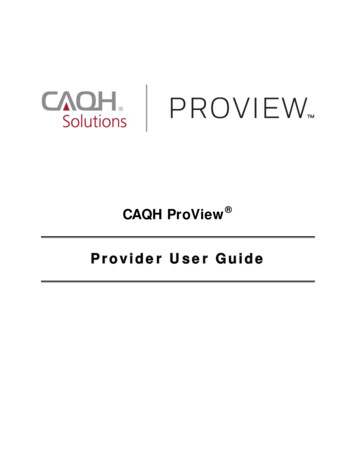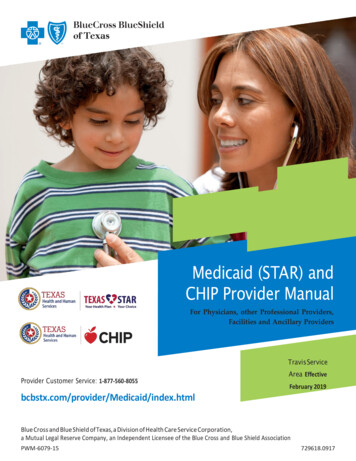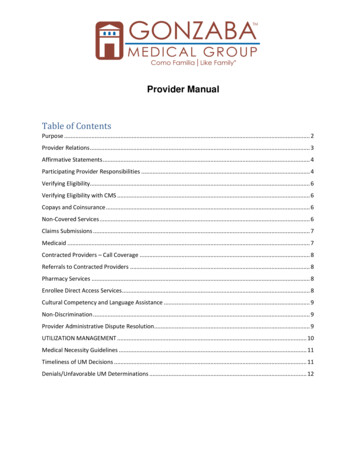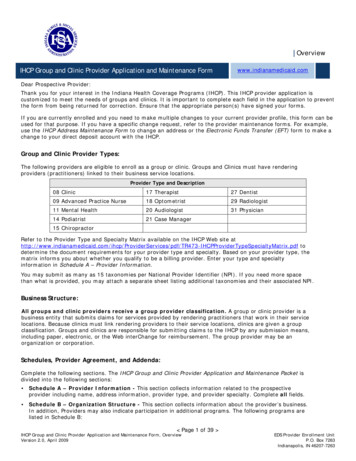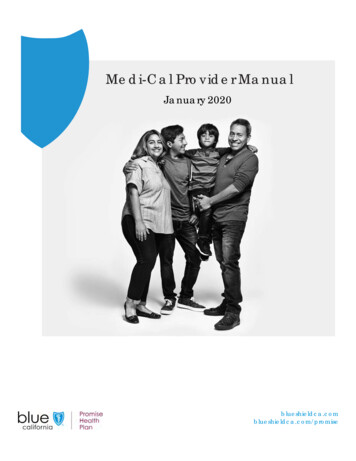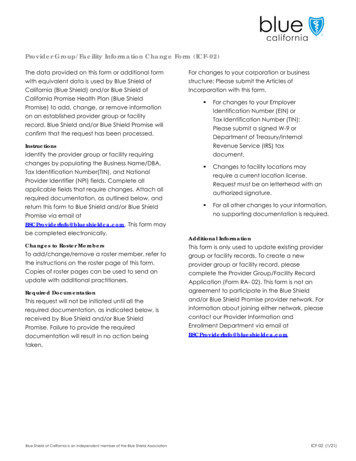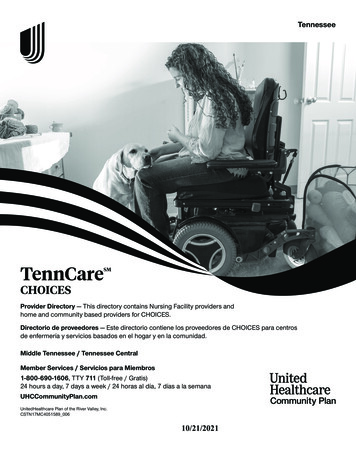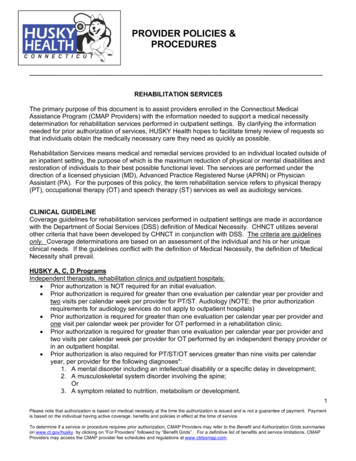
Transcription
PROVIDER POLICIES &PROCEDURESREHABILITATION SERVICESThe primary purpose of this document is to assist providers enrolled in the Connecticut MedicalAssistance Program (CMAP Providers) with the information needed to support a medical necessitydetermination for rehabilitation services performed in outpatient settings. By clarifying the informationneeded for prior authorization of services, HUSKY Health hopes to facilitate timely review of requests sothat individuals obtain the medically necessary care they need as quickly as possible.Rehabilitation Services means medical and remedial services provided to an individual located outside ofan inpatient setting, the purpose of which is the maximum reduction of physical or mental disabilities andrestoration of individuals to their best possible functional level. The services are performed under thedirection of a licensed physician (MD), Advanced Practice Registered Nurse (APRN) or PhysicianAssistant (PA). For the purposes of this policy, the term rehabilitation service refers to physical therapy(PT), occupational therapy (OT) and speech therapy (ST) services as well as audiology services.CLINICAL GUIDELINECoverage guidelines for rehabilitation services performed in outpatient settings are made in accordancewith the Department of Social Services (DSS) definition of Medical Necessity. CHNCT utilizes severalother criteria that have been developed by CHNCT in conjunction with DSS. The criteria are guidelinesonly. Coverage determinations are based on an assessment of the individual and his or her uniqueclinical needs. If the guidelines conflict with the definition of Medical Necessity, the definition of MedicalNecessity shall prevail.HUSKY A, C, D ProgramsIndependent therapists, rehabilitation clinics and outpatient hospitals: Prior authorization is NOT required for an initial evaluation. Prior authorization is required for greater than one evaluation per calendar year per provider andtwo visits per calendar week per provider for PT/ST. Audiology (NOTE: the prior authorizationrequirements for audiology services do not apply to outpatient hospitals) Prior authorization is required for greater than one evaluation per calendar year per provider andone visit per calendar week per provider for OT performed in a rehabilitation clinic. Prior authorization is required for greater than one evaluation per calendar year per provider andtwo visits per calendar week per provider for OT performed by an independent therapy provider orin an outpatient hospital. Prior authorization is also required for PT/ST/OT services greater than nine visits per calendaryear, per provider for the following diagnoses*:1. A mental disorder including an intellectual disability or a specific delay in development;2. A musculoskeletal system disorder involving the spine;Or3. A symptom related to nutrition, metabolism or development.1Please note that authorization is based on medical necessity at the time the authorization is issued and is not a guarantee of payment. Paymentis based on the individual having active coverage, benefits and policies in effect at the time of service.To determine if a service or procedure requires prior authorization, CMAP Providers may refer to the Benefit and Authorization Grids summarieson www.ct.gov/husky by clicking on “For Providers” followed by “Benefit Grids”. For a definitive list of benefits and service limitations, CMAPProviders may access the CMAP provider fee schedules and regulations at www.ctdssmap.com.
*For a list of corresponding ICD-10 CM diagnosis codes, please visit the DSS Fee ScheduleInstructions located at www.ctdssmap.com Provider Provider Fee Schedule Download Provider Fee Schedule Instructions (Table 15).Physician therapy providers: Prior authorization is required for greater than two visits per calendar week per provider for PT. Prior authorization is also required for PT services greater than nine visits per calendar year, perprovider for the following diagnoses*:1. A mental disorder including an intellectual disability or a specific delay in development;2. A musculoskeletal system disorder involving the spine; or3. A symptom related to nutrition, metabolism or development.*For a list of corresponding ICD-10 CM diagnosis codes, please visit the DSS Fee ScheduleInstructions located at www.ctdssmap.com Provider Provider Fee Schedule Download Provider Fee Schedule Instructions (Table 15).Home Health Agencies: Prior authorization is NOT required for an initial evaluation. Prior authorization is required for PT/ST services for greater than the initial evaluation and twovisits per week. Prior authorization is required for OT services for greater than the initial evaluation and one visitper week Prior authorization is also required for PT/ST/OT services greater than nine visits per therapy, percalendar year, per provider for the following diagnoses*:1. A mental disorder including an intellectual disability or a specific delay in development;2. A musculoskeletal system disorder involving the spine; or3. A symptom related to nutrition, metabolism or development.*For a list of corresponding ICD-10 CM diagnosis codes, please visit the DSS Fee ScheduleInstructions located at www.ctdssmap.com Provider Provider Fee Schedule Download Provider Fee Schedule Instructions (Table 15).Limitations – HUSKY A, C and DPhysical, occupational, and speech therapies and audiology services are typically not covered forindividuals 21 years of age and older when provided in an independent setting. Individuals coveredunder the HUSKY A, C and D Programs must receive these services in a clinic setting. This limitationapplies only to therapy providers and therapy groups. Physicians and physicians groups are not subjectto this limitation.HUSKY B ProgramIndependent therapists, physician therapy providers, rehabilitation clinics, outpatient hospitals and homehealth agencies: Prior authorization is NOT required for an initial evaluation. Prior authorization is required for all PT/OT/ST and audiology services after the initial evaluation.Limitations HUSKY B:Short term rehabilitation services (physical, occupational, speech therapies and audiology services) aretypically limited to 60 days of combined services per injury or condition. This applies to services2Please note that authorization is based on medical necessity at the time the authorization is issued and is not a guarantee of payment. Paymentis based on the individual having active coverage, benefits and policies in effect at the time of service.To determine if a service or procedure requires prior authorization, CMAP Providers may refer to the Benefit and Authorization Grids summarieson www.ct.gov/husky by clicking on “For Providers” followed by “Benefit Grids”. For a definitive list of benefits and service limitations, CMAPProviders may access the CMAP provider fee schedules and regulations at www.ctdssmap.com.
performed by home health agencies, clinics, outpatient hospitals, physician therapy providers andindependent therapists.Individuals covered under the HUSKY B program may be eligible for supplemental coverage ofrehabilitation services under the HUSKY Plus Program. HUSKY Plus provides supplemental coverage ofchildren with intensive physical health needs for services not covered under the HUSKY B plan.NOTE: EPSDT Special ProvisionEarly and Periodic Screening, Diagnosis, and Treatment (EPSDT) is a federal Medicaid requirement thatrequires the Connecticut Medical Assistance Program (CMAP) to cover services, products, or proceduresfor Medicaid enrollees under 21 years of age where the service or good is medically necessary healthcare to correct or ameliorate a defect, physical or mental illness, or a condition identified through ascreening examination. The applicable definition of medical necessity is set forth in Conn. Gen. Stat.Section 17b-259b (2011) [ref. CMAP Provider Bulletin PB 2011-36].PROCEDUREThe following information is needed to review initial requests for rehabilitation services:1. Fully completed State of Connecticut, Department of Social Services Outpatient PriorAuthorization Request form OR fully completed authorization request via on-line web portal;2. Clinical evaluation;3. Treatment plan;4. Treatment goals; and5. Other pertinent information as requested by CHNCT.The following information is needed to review requests for the continuation of rehabilitationservices:1. Prescription or signed therapy treatment plan;2. Fully completed State of Connecticut, Department of Social Services Outpatient PriorAuthorization Request Form OR fully completed authorization request via on-line web portal;3. Detailed listing of requested services including frequency and duration;4. Clinical information supporting the need for requested services;5. Treatment goals;6. Updated progress report; and7. Other pertinent information as requested by CHNCT.Review Process:Initial authorization requests for rehabilitation services will be reviewed within two business days. Reauthorization requests for rehabilitation services will be reviewed within 14 calendar days.Requesting AuthorizationIndependent therapists, rehabilitation clinics and physician therapy providers: Requests for the prior authorization of rehabilitation services performed in independent settings,rehabilitation clinics and physician offices must be made using a code grouping (see below) asopposed to individual CPT codes.3Please note that authorization is based on medical necessity at the time the authorization is issued and is not a guarantee of payment. Paymentis based on the individual having active coverage, benefits and policies in effect at the time of service.To determine if a service or procedure requires prior authorization, CMAP Providers may refer to the Benefit and Authorization Grids summarieson www.ct.gov/husky by clicking on “For Providers” followed by “Benefit Grids”. For a definitive list of benefits and service limitations, CMAPProviders may access the CMAP provider fee schedules and regulations at www.ctdssmap.com.
Example: When requesting an initial authorization for the first 3 months of physical therapyprovided in an independent therapy setting, prior authorization request would be made using codegroup INPTI.Example: When requesting re-authorization for an additional 3 months of physical therapyprovided in an independent setting, prior authorization request would be made using code groupINPTR.Authorization requests for rehabilitation services must include a number of units. Units DO NOTequal visits. Providers must submit the full amount of units they will submit claims for during thefull authorization period.Example: The individual needs to be seen by a physical therapist twice a week for 1 month, atotal of 8 visits. During each visit the individual will have 30 minutes of electrical stimulation(97032-2 units), an application of a hot pack (97010 – 1 unit) and 30 minutes of manualmanipulation (97140 – 2 units). The total number of units of physical therapy services providedPER VISIT is five (2 units of 97032, 1 unit of 97010 and 2 units of 97140). Five multiplied by thetotal number of visits during the initial authorization period (8) is 40. For the initial authorization,provider would request INPTI with 40 units. Claim would be submitted with CPT Code(s),modifier(s) and number of units.Outpatient hospitals: Requests for prior authorization of rehabilitation services performed in an outpatient hospital clinicsetting must be made using the applicable revenue center code(s). Authorization requests for rehabilitation services must include the number of units. The numberof units equals the number of visits.Home health agencies: Requests for prior authorization of rehabilitation services performed by a home health agencymust be made using the applicable revenue center code as identified on the DSS Home HealthFee Schedule. Authorization requests for rehabilitation services must include the number of units. The numberof units equals the number of visits.EFFECTIVE DATEThis Policy is effective for prior authorization requests for rehabilitation services for individuals coveredunder the HUSKY Health Program on or after July 1, 2012.CODES AND CODE GROUPINGSRehabilitation Clinics:CodeGroupRCSTIRCSTRRCPTIBenefitCPT Codes/ModifiersST InitialSTReauthorizationPT Initial92507, 92508, 92526, 92521, 92522, 92523, 9252429125, 29126, 29131, 29260, 29280, 29540, 64550, 90901, 97001,97002, 97010-97022, 97026, 97032-97035, 97110-97124, 971404Please note that authorization is based on medical necessity at the time the authorization is issued and is not a guarantee of payment. Paymentis based on the individual having active coverage, benefits and policies in effect at the time of service.To determine if a service or procedure requires prior authorization, CMAP Providers may refer to the Benefit and Authorization Grids summarieson www.ct.gov/husky by clicking on “For Providers” followed by “Benefit Grids”. For a definitive list of benefits and service limitations, CMAPProviders may access the CMAP provider fee schedules and regulations at www.ctdssmap.com.
RCPTRRCOTIPTReauthorizationOT InitialRCOTR OTReauthorization97535, 97542, 97597-97602, 97760-97762 (all with modifier GP or allwith modifiers GP and 59 )29125, 29126, 29131, 29260, 29280, 29540, 64550, 90901, 97003,97004, 97010 – 97022, 97026, 97032-97035, 97110-97124, 9714097535, 97542, 97597-97602, 97760-97762 (all with modifier GO or allwith modifiers GO and 59)For services performed in a rehabilitation clinic not included in the table above request authorizationusing the applicable CPT or HCPCS code.Audiology evaluations in excess of one per year will require prior authorization. Please submitauthorization requests using the applicable CPT codes as listed on the DSS Rehabilitation Clinic FeeSchedule.Independent Therapists:CodeBenefitGroupINSTIST InitialINSTR STReauthorizationINPTIPT InitialINPTR PTReauthorizationINOTI OT InitialINOTR OTReauthorizationCPT Codes92507, 92508, 92521, 92522, 92523, 9252497002, 97010-97150, 97530, 97542, 97760, 9776197004, 97010-97150, 97530, 97542, 97760, 97761Physician Therapy Providers:CodeBenefitCPT CodesGroupMDPTI Physician97010-97530, 97533-97546Therapy InitialMDPTR PhysicianTherapyReauthorizationDEFINITIONS1. Audiology or Audiological Services: The application of principles, methods and procedures ofmeasurement, testing, appraisal, prediction, consultation, counseling and the determination and useof appropriate amplification related to hearing and disorders of hearing, for the purpose of modifying5Please note that authorization is based on medical necessity at the time the authorization is issued and is not a guarantee of payment. Paymentis based on the individual having active coverage, benefits and policies in effect at the time of service.To determine if a service or procedure requires prior authorization, CMAP Providers may refer to the Benefit and Authorization Grids summarieson www.ct.gov/husky by clicking on “For Providers” followed by “Benefit Grids”. For a definitive list of benefits and service limitations, CMAPProviders may access the CMAP provider fee schedules and regulations at www.ctdssmap.com.
communicative disorders involving speech, language, auditory function or other aberrant behaviorrelated in hearing loss. Services are performed by an audiologist.2. Current Procedural Terminology (CPT): The most recent edition of a listing, published by theAmerican Medical Association, of descriptive terms and identifying codes for reporting medicalservices performed by providers.3. Healthcare Common Procedure Coding System (HCPCS): A system of national health care codesthat includes the following: Level I is the American Medical Association Physician’s CommonProcedural Terminology (CPT codes). Level II covers services and supplies not covered in CPT.Level III includes local codes used by state Medicare carriers4. HUSKY A: Connecticut children and their parents or a relative caregiver; and pregnant women mayqualify for HUSKY A (also known as Medicaid). Income limits apply.5. HUSKY B: Uninsured children under the age of 19 in higher income households may be eligible forHUSKY B (also known as the Children’s Health Insurance Program) depending on their family incomelevel. Family cost-sharing may apply.6. HUSKY C: Connecticut residents who are age 65 or older or residents who are ages 18-64 and who areblind, or have another disability, may qualify for Medicaid coverage under HUSKY C (this includesMedicaid for Employees with Disabilities (MED-Connect), if working). Income and asset limits apply.7. HUSKY D: Connecticut residents who are ages 19-64 without dependent children and who: (1) do notqualify for HUSKY A; (2) do not receive Medicare; and (3) are not pregnant, may qualify for HUSKY D(also known as Medicaid for the Lowest-Income populations).8. HUSKY Health Program: The HUSKY A, HUSKY B, HUSKY C, HUSKY D and HUSKY LimitedBenefit programs, collectively.9. HUSKY Limited Benefit Program or HUSKY, LBP: Connecticut’s implementation of limited healthinsurance coverage under Medicaid for individuals with tuberculosis or for family planning purposesand such coverage is substantially less than the full Medicaid coverage.10. HUSKY Plus Physical Program (or HUSKY Plus Program): A supplemental physical healthprogram pursuant to Conn. Gen. Stat. § 17b-294, for medically eligible members of HUSKY B inIncome Bands 1 and 2, whose intensive physical health needs cannot be accommodated within theHUSKY Plan, Part B.11. Medically Necessary or Medical Necessity: (as defined in Connecticut General Statutes § 17b259b) Those health services required to prevent, identify, diagnose, treat, rehabilitate or amelioratean individual's medical condition, including mental illness, or its effects, in order to attain or maintainthe individual's achievable health and independent functioning provided such services are: (1)Consistent with generally-accepted standards of medical practice that are defined as standards thatare based on (A) credible scientific evidence published in peer-reviewed medical literature that isgenerally recognized by the relevant medical community, (B) recommendations of a physicianspecialty society, (C) the views of physicians practicing in relevant clinical areas, and (D) any otherrelevant factors; (2) clinically appropriate in terms of type, frequency, timing, site, extent and durationand considered effective for the individual's illness, injury or disease; (3) not primarily for theconvenience of the individual, the individual's health care provider or other health care providers; (4)not more costly than an alternative service or sequence of services at least as likely to produceequivalent therapeutic or diagnostic results as to the diagnosis or treatment of the individual's illness,injury or disease; and (5) based on an assessment of the individual and his or her medical condition.12. Occupational therapy: Services prescribed by a physician for the evaluation, planning, andimplementation of a program of purposeful activities to develop or maintain adaptive skills necessaryto achieve the maximal physical and mental functioning of the individual in his daily pursuits. Thepractice of “occupational therapy” includes, but is not limited to, evaluation and treatment ofindividuals whose abilities to cope with the tasks of living are threatened or impaired by physical6Please note that authorization is based on medical necessity at the time the authorization is issued and is not a guarantee of payment. Paymentis based on the individual having active coverage, benefits and policies in effect at the time of service.To determine if a service or procedure requires prior authorization, CMAP Providers may refer to the Benefit and Authorization Grids summarieson www.ct.gov/husky by clicking on “For Providers” followed by “Benefit Grids”. For a definitive list of benefits
one visit per calendar week per provider for OT performed in a rehabilitation clinic. Prior authorization is required for greater than one evaluation per calendar year per provider and two visits per calendar week per provider for OT performed by an independent therap
